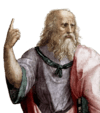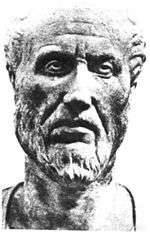Transcendentals
| Part of a series on |
| Platonism |
|---|
 |
| Allegories and metaphors |
| Related articles |
|
| Part of a series on |
| Neoplatonism |
|---|
 Reconstructed bust believed to represent Plotinus |
|
People
|
|
|
The transcendentals (Latin: transcendentalia) are the properties of being that correspond to three aspects of the human field of interest and are their ideals; science (truth), the arts (beauty) and religion (goodness). Philosophical disciplines that study them are logic, aesthetics and ethics.
History
Parmenides first inquired of the properties co-extensive with being.[1] Socrates, spoken through Plato, then followed (see Form of the Good).
Aristotle's substance theory (being a substance belongs to being qua being) has been interpreted as a theory of transcendentals.[2] Aristotle discusses only unity ("One") explicitly because it is the only transcendental intrinsically related to being, whereas truth and goodness relate to rational creatures.[3]
In the Middle Ages, Catholic philosophers elaborated the thought that there exist transcendentals (transcendentalia) and that they transcended each of the ten Aristotelian categories.[4] A doctrine of the transcendentality of the good was formulated by Albert the Great.[5] His pupil, Saint Thomas Aquinas, posited five transcendentals: res, unum, aliquid, bonum, verum; or "thing", "one", "something", "good", and "true".[6] Saint Thomas derives the five explicitly as transcendentals,[7] though in some cases he follows the typical list of the transcendentals consisting of the One, the Good, and the True. The transcendentals are ontologically one and thus they are convertible: e.g., where there is truth, there is beauty and goodness also.
In Christian theology the transcendentals are treated in relation to theology proper, the doctrine of God. The transcendentals, according to Christian doctrine, can be described as the ultimate desires of man. Man ultimately strives for perfection, which takes form through the desire for perfect attainment of the transcendentals. The Catholic Church teaches that God is Himself truth, goodness, and beauty, as indicated in the Catechism of the Catholic Church.[8] Each transcends the limitations of place and time, and is rooted in being. The transcendentals are not contingent upon cultural diversity, religious doctrine, or personal ideologies, but are the objective properties of all that exists.
See also
References
- ↑ DK fragment B 8
- ↑ Aristotle, Metaphysics 1028b4; Allan Bäck, Aristotle's Theory of Abstraction, Springer, 2014, p. 210: "Since all that is, in any category is in virtue of having some relation to substance..., being a substance belongs to being qua being. Because of the centrality of substance for something to be, Aristotle says, "what is being is just the question what is substance." [Metaph. 1028b4] Given Aristotle’s account of focal meaning, it has turned out that x is a being only if x is a substance. Items in non-substantial categories are beings, secondarily, only given their being in substance. ... [Ι]n Metaphysics IV, Aristotle offers both transcendental and categorical items as proper subjects for first philosophy."
- ↑ Aristotle, Metaphysics X.1–2; Benedict Ashley, The Way toward Wisdom: An Interdisciplinary and Intercultural Introduction to Metaphysics (University of Notre Dame Press, 2006), p. 175.
- ↑ Scott MacDonald (ed.), Being and Goodness: The Concept of the Good in Metaphysics and Philosophical Theology, Cornell University Press, 1991, p. 56.
- ↑ Medieval Theories of Transcendentals (Stanford Encyclopedia of Philosophy)
- ↑ Disputed Questions on Truth, Q. 1 A. 1.
- ↑ De Veritate, Q. 1 A.1
- ↑ Catechism of the Catholic Church references these three at Section 41.
Bibliography
- Jan A. Aertsen, Medieval Philosophy and the Transcendentals: the Case of Thomas Aquinas, Leiden: Brill, 1996.
- Jan A. Aertsen, Medieval Philosophy as Transcendental Thought. From Philip the Chancellor (ca. 1225) to Francisco Suárez, Leiden: Brill, 2012.
- John P. Doyle, On the Borders of Being and Knowing. Late Scholastic Theory of Supertranscendental Being, Leuven: Leuven University Press, 2012.
- Graziella Federici Vescovini (éd.), Le problème des Transcendantaux du XIVe au XVIIe siècle, Paris: Vrin, « Bibliothèque d’Histoire de la Philosophie », 2001.
- Bruno Pinchard (éd.), Fine folie ou la catastrophe humaniste, études sur les transcendantaux à la Renaissance, Paris, Champion, 1995.
- Piero di Vona, Spinoza e i trascendentali, Napoli: Morano, 1977.
